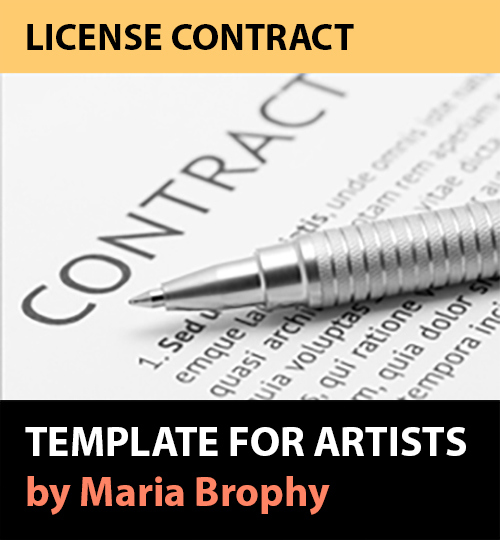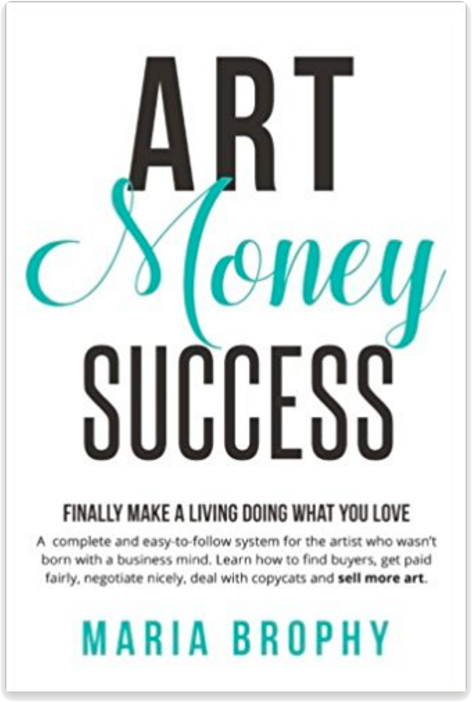Contracts are not fun to deal with. They are extra work, and for an artist, just painting is time-consuming. After all, can’t we all just trust each other?
The big misconception about contracts is that they are only necessary for big dollar deals, or for strangers.
The reality is that contracts help to avoid misunderstandings by clarifying each person’s responsibility.
And this is necessary to keep a good relationship with your clients and the friends that you do business with. (Yes, I said “friends.” Use written agreements with them, too.)
Here are three good reasons to put your agreement in writing:
1.) To make sure that both parties are agreeing to the same thing. Verbal agreement is where misunderstandings and assumptions happen. Written words provide clarity.
During the process of drawing up the agreement, you will hash out details with your client that you otherwise may not consider.
An example: A gallery wants to carry your artwork. The consignment agreement spells out who is going to pay for the shipping to and from; when the gallery has to pay the artist when a piece sells; who is financially responsible should the artwork become damaged; and so on. These are the little details that can become big later. The contract spells it out before you ship $50,000 worth of your art to a gallery.
2.) To hold each party accountable for what they’ve agreed to. Over time, you’ll forget exactly what you’ve agreed to. The contract will refresh your memory.
3.) To cover your butt. This comes in handy if ever accused of not holding up your end – refer to the contract and point out that you are. (Or read it and go, “oh yeah, I agreed to that”!)
When we did our deal with Seven Films to create the DVD “Paint Pen Techniques with Drew Brophy”, I asked one of our new partners if he wanted to draw up the contract on his end.
He said “Oh, we don’t need a contract. We’re good friends.” To which I replied “Yes, and if we want to remain friends, we’ll need a contract!”
It’s a good thing I insisted, because we later discovered some inconsistencies in our thinking!
I drew up the contract myself, thanks to a very good template that I found online. I outlined the various points that we had all agreed to in our meetings.
When I presented the contract to our new partners for review, they shook their heads no. “What?” I asked, confused. They pointed out a few items that they hadn’t agreed to. I had misunderstood certain details. We discussed it then and there, came to an understanding, and I revised the contract accordingly. Had we not had a contract, and that issue came up later, we would have been on opposite ends, arguing about it, and it could have been a problem.
For artists, it’s especially important to have a contract for the following situations:
- Gallery Agreement and any type of Consignment
- Licensing
- Events where the artist is hired to attend/perform at
- Any form of partnership where there is a royalty or shared profit
You don’t have to hire an attorney for all of these items. You could find a gallery and consignment agreement in the back of many books for artists, particularly The Graphic Artists Guild Handbook: Pricing and Ethical Guidelines.
You can also do a search online and find many contracts which you can download and adjust according to your own situation.
Or, you could buy my simple contract template here: http://bit.ly/1zOwhZN
For the larger deals, such as big licensing deals where there are royalties involved, I recommend finding an attorney that specializes in that area. You never want to use a general attorney for licensing deals – they won’t know all the issues. There are many attorneys that specialize in artist’s issues that you can find online.
The good news is that dealing with contracts gets easier and easier. Once you have your templates, you can re-use them over and over again, making minor adjustments to fit each deal.
Cover your butt and use contracts! I wish you great success –
Maria xxoo
PS: Feel free to ask me anything on this topic. If you are having a difficult time knowing how to handle a contract or deal, please set up a consulting call with me. I can help! I have dealt with more contracts in my life than most people do! Visit my consulting page here.
Would you like your own licensing agreement template that you can use again and again? My LICENSING AGREEMENT/CONTRACT TEMPLATE PACKAGE is now available. This package makes it easy for you! Complete with a template that you can change as needed, and instructions, this is the perfect short, simple agreement for artists not yet ready to hire an attorney. More details here: Licensing Agreement/Contract Template Package















